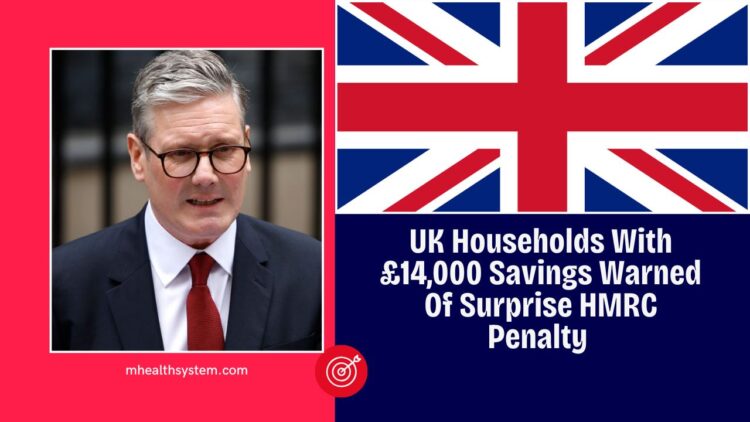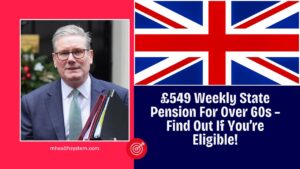As interest rates remain elevated and tax thresholds stay frozen, thousands of UK households with savings around £14,000 or more are being caught off guard by unexpected tax bills from HMRC. The culprit?
A combination of rising interest earnings and reduced personal savings allowances that put ordinary savers at risk of a stealth tax raid.
Let’s break down the full details and show how to avoid this growing financial trap.
Why £14,000 in Savings Could Trigger a Tax Penalty
The UK government offers a Personal Savings Allowance (PSA)—a tax-free threshold for interest earned on savings. However, that allowance shrinks depending on your income tax bracket:
- Basic-rate taxpayers (20%): £1,000 tax-free
- Higher-rate taxpayers (40%): £500 tax-free
- Additional-rate taxpayers (45%): £0 tax-free
With average savings interest rates currently around 3.53% AER, savers holding just over £14,000 could easily earn more than £500 in interest annually—crossing the threshold for higher-rate taxpayers and incurring an unexpected tax liability.
Understanding AER and How It Affects Tax
AER, or Annual Equivalent Rate, is the true rate of return on your savings, factoring in compound interest. With competitive savings products currently paying 3.5% to 5%, savers are seeing better returns—but this also increases the risk of breaching their PSA.
For example:
| Savings Amount | Interest Rate (AER) | Annual Interest | Taxable (for 40% taxpayer) | Tax Due (40%) |
|---|---|---|---|---|
| £14,000 | 3.53% | £494.20 | £0 | £0 |
| £14,500 | 3.53% | £512.20 | £12.20 | £4.88 |
| £18,000 | 4.5% | £810.00 | £310.00 | £124.00 |
| £25,000 | 5% | £1,250.00 | £750.00 | £300.00 |
Even modest savings can lead to liabilities if left unmanaged.
Why This Tax Is Catching Savers Off Guard
The tax system is now more automated. HMRC receives interest data from banks and compares it to each individual’s PSA. If you’ve exceeded the allowance, HMRC may adjust your tax code, issue a self-assessment letter, or apply penalties and interest.
Worse yet, not every savings account is accurately linked to your National Insurance record, meaning some taxpayers may not receive a heads-up before facing fines. Late payment interest is charged at 8.5%, and failing to declare interest could lead to additional penalties.
How to Avoid the Surprise Tax Bill
The good news? There are several ways to safeguard your savings from unwanted tax hits.
1. Make Full Use of Your ISA Allowance
You can save up to £20,000 annually in a Cash ISA, and all interest earned remains completely tax-free. With some easy-access ISAs offering up to 5% interest, you can earn more while avoiding the PSA limit altogether.
2. Split Savings Between Partners
Couples can double their PSA by holding savings in each person’s name. For example, a basic-rate couple could shelter £2,000 in interest annually with no tax liability.
3. Consider Premium Bonds or NS&I Products
Premium Bonds offer tax-free prizes instead of interest and are not counted toward your PSA. Other National Savings products are also tax-free.
4. Monitor Your Interest Earnings
Track your account statements and calculate how much interest you’re set to earn across all accounts. Stay below your PSA or move excess funds into ISAs.
Who’s Most at Risk?
The following groups should pay extra attention:
- Higher-rate taxpayers with more than £14,000 in savings
- Individuals with multiple savings accounts
- Savers using only standard savings accounts, not ISAs
- Anyone who hasn’t recently checked their total interest earnings
Even if you haven’t received a notice from HMRC, you may still be liable. It’s your responsibility to declare savings income that exceeds the PSA.
In an era of rising interest rates, even moderate savers are finding themselves unintentionally crossing the savings tax threshold. With £14,000 or more in savings, especially for higher-rate taxpayers, a surprise HMRC bill could be just around the corner.
To avoid this financial pitfall:
- Use ISAs
- Split savings wisely
- Track your interest
- Understand your PSA limits
By staying informed and taking early action, you can continue growing your savings without sacrificing a penny more than necessary in tax. Don’t let a tax raid ruin your returns—plan now to stay ahead.
FAQs
Will HMRC contact me if I exceed my savings allowance?
Not always. Although HMRC receives data from banks, mismatches can happen. If you’re unsure, check your interest earnings and contact HMRC or file a self-assessment.
Can I avoid the tax by moving funds into an ISA now?
Yes. Transferring savings into a Cash ISA shelters them from tax going forward. Interest earned within an ISA does not count toward your PSA.
What happens if I don’t pay the tax?
Failure to declare or pay interest tax could result in HMRC issuing penalties, interest charges, and demands for backdated payments. The sooner you resolve it, the lower your risk.




